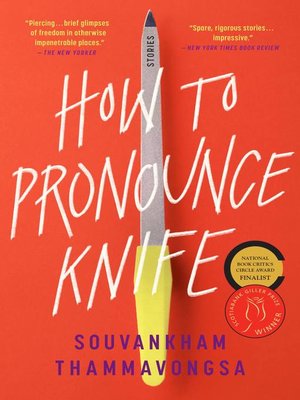
We see this happening around us, but we can never really live in the shoes of others, so I’d argue a book like this is the next best thing.Īuthor Souvankham Thammavongsa, photo by Sarah Bodri Each story was difficult to read in its own way, the pain of each character obvious to anyone with a sliver of empathy the young girl struggling to pronounce the word ‘knife’ when her father incorrectly advises her to make the ‘k’ sound the night before school, the simple husband oblivious to the older, wealthier white man sleeping with his wife in their marital home while he watches tv in the next room, the hard-working mother who breaks her back picking worms in the middle of the night only to lose her promotion to a white teenager who is fluent in English, all these people and the situations they inhabit are both all too familiar, and all too foreign. If you’ve gotten this far into my review you’ll already know what my thoughts are, I clearly loved this book, and believe its author is very talented. Luckily this book gives a voice and depth to those we so easily ignore and take for granted, all in gorgeous prose. So often, we expect immigrants and refugees to act a certain way obedient, tough, hard-working, grateful, quiet. A refugee herself, Tammavongsa digs below the typical immigrant narrative, past the early struggles of language and culture upheaval to reveal the internal conflict that may or may not have existed before their move. Most are refugees, so although their past trauma is not dwelled upon, (in fact it’s more often than not pushed away), it does shape them and their reactions to their new surroundings. Men, women, children, and adults act as narrators so we can see all facets of their experience. There are 14 stories in this collection, most of them focusing on immigrants and refugees who are new to North America their struggles, triumphs, celebrations and challenges- a whole range of emotions can be found within these pages. In fact, this book is powerful because of what’s been left out, the things that are left unsaid between its characters and their various struggles.

It’s beautifully written and doesn’t include anything more than it has to. This is a slim little book, but that’s not surprising considering how carefully each word has been chosen. It’s rare that a collection of short stories appears on an award list like this, but I’m glad to see the genre is increasing in popularity! My theory is that people have shorter attention spans with the stress of the current pandemic, so short fiction is the medicine we all need right now.

Interestingly, it’s a collection of short stories, written by a poet.

How to Pronounce Knife by Souvankham Thammavongsa most recently appeared on the Scotiabank Giller Prize longlist, and we’ll find out on October 5 if it makes it to the shortlist.


 0 kommentar(er)
0 kommentar(er)
